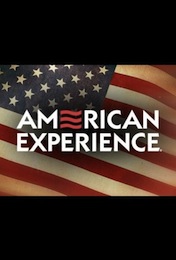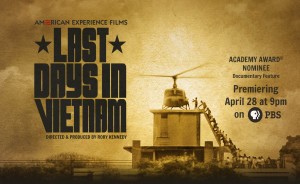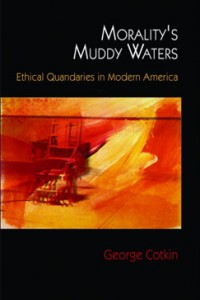 The PBS documentary series American Experience has saved me more than I want to admit (though, just did). It is a go-to series for my courses, especially surveys. I imagine I am not alone in making this confession. You know the promo and intro, the black screen, the series logo spelled out with the stripes of the American flag waving where the “E” should be. Music comes up and a scene that captures the drama of the episode begins.
The PBS documentary series American Experience has saved me more than I want to admit (though, just did). It is a go-to series for my courses, especially surveys. I imagine I am not alone in making this confession. You know the promo and intro, the black screen, the series logo spelled out with the stripes of the American flag waving where the “E” should be. Music comes up and a scene that captures the drama of the episode begins.
Call it symbolic history or history as drama, it often works to illustrate themes I explore in courses and, perhaps most importantly, it provides a common point of reference for students to discuss–especially those who have failed to read the material I have assigned!
Rory  Kennedy’s film Last Days in Vietnam is an American Experience (AE) film as well as production of her own film company. And like many AE productions, Kennedy’s film opens with high drama. Over a shot of a main thoroughfare, the inter-title “Saigon, April 1975” appears (the month that the United States left Vietnam). The first voice viewers hear over scenes of crowded streets is that of Stuart Herrington: “The question, the burning question was, who goes and who gets left behind.” As a captain in the U.S. Army, Herrington had some responsibility for successfully shepherding a few South Vietnamese army officers and their families out of Saigon before it fell. Near the end of this introductory sequence that relates one story of South Vietnamese fleeing their country, Herrington intones: “it was a terrible, terrible moral dilemma…for everybody.”
Kennedy’s film Last Days in Vietnam is an American Experience (AE) film as well as production of her own film company. And like many AE productions, Kennedy’s film opens with high drama. Over a shot of a main thoroughfare, the inter-title “Saigon, April 1975” appears (the month that the United States left Vietnam). The first voice viewers hear over scenes of crowded streets is that of Stuart Herrington: “The question, the burning question was, who goes and who gets left behind.” As a captain in the U.S. Army, Herrington had some responsibility for successfully shepherding a few South Vietnamese army officers and their families out of Saigon before it fell. Near the end of this introductory sequence that relates one story of South Vietnamese fleeing their country, Herrington intones: “it was a terrible, terrible moral dilemma…for everybody.”
 It was and is. American Experience often provides an opening to discuss the drama and, sometimes, the chaos that unfold within the history of the United States. The series also trafficks, as Stuart Herrington conveniently observed, in moral dilemmas. Frankly, morality tales play well in this series.They offer what George Cotkin described in his book Morality’s Muddy Waters as “moral moments” or opportunities to look at how “we often find that even when we begin with the best of moral intentions, things go awry” (1). “Moral moments flow through history,” Cotkin explains “because history is the study of men and women acting and thinking, avoiding or confronting such moments. Of course, unlike historians, these individuals don’t have the luxury of hindsight. But the study of history is wonderfully rich in its potential for capturing their moral quandaries” (4). George’s words might serves as a helpful pop-up tag for those scrolling over episodes of AE.
It was and is. American Experience often provides an opening to discuss the drama and, sometimes, the chaos that unfold within the history of the United States. The series also trafficks, as Stuart Herrington conveniently observed, in moral dilemmas. Frankly, morality tales play well in this series.They offer what George Cotkin described in his book Morality’s Muddy Waters as “moral moments” or opportunities to look at how “we often find that even when we begin with the best of moral intentions, things go awry” (1). “Moral moments flow through history,” Cotkin explains “because history is the study of men and women acting and thinking, avoiding or confronting such moments. Of course, unlike historians, these individuals don’t have the luxury of hindsight. But the study of history is wonderfully rich in its potential for capturing their moral quandaries” (4). George’s words might serves as a helpful pop-up tag for those scrolling over episodes of AE.
According to investigative journalist Nick Turse there is little that can help Kennedy’s documentary. I wrote about Turse’s critique of Last Days in Vietnam a week ago, and this week, in Cotkin-like fashion, I seek to complicate that other post a bit. First, let’s consider the series in which Kennedy’s film appears.
American Experience began in 1987 from the work primarily of Judy Crichton who had been an award winning reporter, director, and producer for the major networks and PBS. In a conversation she had with William R. Ferris in 1998, then the chairman of the National Endowment of the Humanities, Crichton explained that the impetus for AE came in response to the paucity of history on television. Crichton recalls that Peter McGhee, who in the 1980s was the vice president for programming at Boston’s PBS affiliate WGBH, “looked out on the field and decided there had to be a history series that would do for the past what Nova did for science, and I was invited to become part of that experiment. It was the most wonderful assignment I ever had.”
At the center of this project was a basic ideological and intellectual conundrum–material for the series had to be lively but not too controversial (some might say, not controversial at all). Crichton related that “we tried to teach people how to move from subject to story, to identify the corner that interested them the most and that had a strong narrative drive” (emphasis added). She explained that all those involved were typically aware of how material on the screen was made to stand-in for a massive amount of argument and ideas in the records and scholarship. Thus, the use of moral moments to capture AND reduce the complexity of larger moral dilemmas.
Equally significant, Crichton noted the “social and political pressures under which [creators of the series] were working.” She argued that they worked under two forms of self-censorship: “the first is really pernicious in that it’s the desire to be popular.” The second form of self-censorship expressed itself in the inability or unwillingness to discuss “the role of people who took unpopular positions,” and in particular, “the American Left.” I imagine that many readers of this blog would add subjects lumped together on the American Right, as well. Either way, Crichton’s reflections strike me as more ominous when we consider that she hoped the series might push viewers “to talk about who we are as a people and as a society.”
In its reduction, simplification, and outright avoidance of certain subjects in American life, American Experience has played a significant role in constructing American historical memory–just a role that has particular limitations. This is not to say that with twenty-six seasons and at least 302 episodes, the series should not be praised for its many successes. As Crichton declares: “I object very much to the idea that this will be the only film made about Lyndon Johnson or the Civil War or whatever the subject is. There will be other writes, other producers. There is a need for seeing the major stories of our past from a variety of perspectives, personal as well as political.”
Thus, what should we make of Turse’s scathing criticism of Last Days in Vietnam? Frankly, he and AE share something in common–they both let a “corner of history” stand in for more than their narratives can support. If Turse is critical of peddling of a popular patriotic view of the American war effort in Vietnam, Turse’s critics hit him for offering more than what he actually delivers. For example, Heather M. Stur, author of Beyond Combat: Women and Gender in the Vietnam Era, points out that Turse’s claim to have uncovered a “hidden history” of the Vietnam War through his documentation of atrocities is simply untrue. “From the Winter Soldier Investigation of 1972 to all the published sources Turse uses to make his case, atrocities have been part of the public record on Vietnam for decades.” Stur refers to a group of contemporary historians who have all dealt with various aspects of Turse’s argument in ways that go deeper and more precisely into the claims he makes about the psychology of American servicemen, the desensitizing nature of technological warfare, and the “links between military machismo and sexual assault by U.S. troops against Vietnamese–and American–women.”
A larger problem lurks for critics of Turse’s arguments–he fails to analyze “the broader implications of the atrocities he details,” Stur adds. Thomas Weyant of the University of Akron, notes that “There is something ironic about a book that seeks to contextualize the My Lai massacre yet does not fully contextualize the war itself…He makes very limited efforts to discern how World War II, the Korean conflict, or even the Cold War influenced the decisions made in prosecuting the war in Vietnam.” Moreover, and something consistent with the kind of “corner” history that both AE and Turse offer, “the author acknowledges the existence of Vietnamese atrocities but quickly dismisses them as not relevant to his argument: the result is that his look at atrocities in Vietnam places American incidents in a false vacuum.” Thus the most serious charge Turse leveled at Kennedy’s film–the lack of context that gives way to a one-dimensional portrait of America–applies to his work as well.
Of course none of the criticism leveled at either Turse or Kennedy should persuade us to dismiss their work or the moral moments they investigate. As George Cotkin explains: “Few targets are as evasive and ever-shifting as a moral dilemma. In this sense, the examination of moral issues, within the frame of historical narrative, helps us see how others have faced up to, or ignored, moral questions” (4).

3 Thoughts on this Post
S-USIH Comment Policy
We ask that those who participate in the discussions generated in the Comments section do so with the same decorum as they would in any other academic setting or context. Since the USIH bloggers write under our real names, we would prefer that our commenters also identify themselves by their real name. As our primary goal is to stimulate and engage in fruitful and productive discussion, ad hominem attacks (personal or professional), unnecessary insults, and/or mean-spiritedness have no place in the USIH Blog’s Comments section. Therefore, we reserve the right to remove any comments that contain any of the above and/or are not intended to further the discussion of the topic of the post. We welcome suggestions for corrections to any of our posts. As the official blog of the Society of US Intellectual History, we hope to foster a diverse community of scholars and readers who engage with one another in discussions of US intellectual history, broadly understood.
This is a fascinating post, Ray.
I understand “corner” as a market term, deriving from the rise of the stock market in the 19th century–identifying and working a “corner” was like identifying and working an “angle.” As such, it was was subject to moral critique within republican/producerist vision of capitalism. I wonder if this is, indeed, the proper etymology of “corner” here, and if it is, what the implications might be?
Kurt, your comment is excellent, and while I don’t quite know if Crichton had this “angle” in mind, it does capture something about the production of history that is reliant on sponsors–government and corporate. It will take the kind of work you are doing and proposing to re-imagine the ways American moral imagination is welded to the production of historical memory through the politico-corporate sponsorship of our collective past. You have suggested a wonderfully rich area for research.
That “from the Winter Soldier Investigation of 1972 to all the published sources Turse uses to make his case, atrocities have been part of the public record on Vietnam for decades,” means only that they have been hiding in plain sight and no one wants to see them. The reasons for which the war was ostensibly fought were proven to be as delusional as George W Bush’s weapons of mass destruction. Yet the perpetrators — the US political/military establishment — emerged from both wars untroubled, unscathed and unrepentant when their monumental utterly destructive folly should have served to discredit them for all time. Ah, but then we’d have to imagine alternatives. Well, the sixties tried.